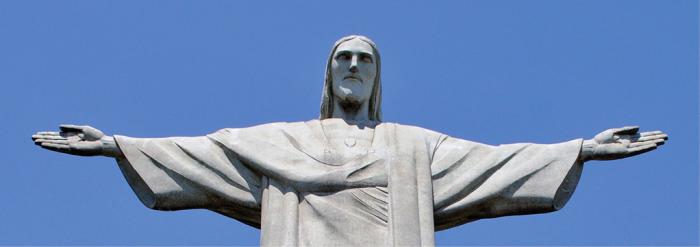
4.6 Hoe kan ik de Wil van God kennen?
In een wereld vol rumoer lijkt het soms een zware opgave om je daar eens van los te maken. Toch is dat van tijd tot tijd nodig, zodat niet de wil van je omgeving, maar de Wil van God in je leven kan weerklinken.
Denk aan Jezus, die regelmatig tijd nam om te bidden, vooral ‘s nachts. En nu jij: maak eens tijd vrij om samen met God te zijn, alleen jullie twee, en ontdek zo wat Hij voor je in petto heeft.
What is prayer?
Prayer is the raising of one’s mind and heart to God, or the petition of good things from him in accord with his Will. It is always the gift of God who comes to encounter man. Christian prayer is the personal and living relationship of the children of God with their Father who is infinitely good, with his Son Jesus Christ, and with the Holy Spirit who dwells in their hearts. [CCCC 534]
What are the precepts of the Church?
They are: 1) to attend Mass on Sundays and other holy days of obligation and to refrain from work and activities which could impede the sanctification of those days; 2) to confess one's sins, receiving the sacrament of Reconciliation at least once each year; 3) to receive the sacrament of the Eucharist at least during the Easter season; 4) to abstain from eating meat and to observe the days of fasting established by the Church; and 5) to help to provide for the material needs of the Church, each according to his own ability. [CCCC 432]
What is the purpose of the precepts of the Church, and how binding are they?
The “Five Precepts of the Church” with their minimum requirements are supposed to remind us that one cannot be a Christian without making a moral effort, without participating personally in the sacramental life of the Church, and without union with her in solidarity. They are obligatory for every Catholic Christian. [Youcat 346]
Why do we have to work to form our character?
We must work at forming our character so that we can freely, joyfully, and easily accomplish what is good. A firm faith in God, in the first place, helps us to do this, but also the practice of the virtues, which means developing within ourselves, with God’s help, firm dispositions, not giving ourselves over to disorderly passions, and directing our faculties of intellect and will more and more consistently toward the good.
The most important virtues are: prudence, justice, fortitude, temperance. These are also called the “cardinal virtues” (from latin cardo = hinge, or from cardinalis = principal). [Youcat 300]
How does a person become prudent?
A person becomes prudent by learning to distinguish what is essential from what is non-essential, to set the right goals and to choose the best means of attaining them.
The virtue of prudence directs all the other virtues. For prudence is the ability to recognize what is right. After all, someone who wants to lead a good life must know what the “good” is and recognize its worth. Like the merchant in the Gospel “who, on finding one pearl of great value, went and sold all that he had and bought it” (Mt 13:46). Only a prudent person can apply the virtues of justice, fortitude, and moderation so as to do good. [Youcat 301]
How does one act justly?
One acts justly by always making sure to give to God and to one’s neighbor what is due to them.
The guiding principle of justice is: “To each his due”. A child with a disability and a highly gifted child must be encouraged in different ways so that each may fulfill his potential. Justice is concerned with equity and longs to see people get that to which they are entitled. We must allow justice to govern our relations with God also and give him what is his: our love and worship. [Youcat 302]
Why is it virtuous to be moderate?
Moderation is a virtue because immoderate behavior proves to be a destructive force in all areas of life.
Someone who is immoderate abandons himself to the rule of his impulses, offends others by his inordinate desires, and harms himself. In the New Testament words like “sobriety” and “discretion” stand for “moderation”. [Youcat 304]
What is faith?
Faith is the power by which we assent to God, acknowledge his truth, and commit ourselves personally to him.
Faith is the path created by God leading to the truth that is God himself. Because Jesus is “the way, and the truth, and the life” (Jn 14:6), this faith cannot be merely an attitude or “confidence” about something or other. On the one hand, the faith has definite contents, which the Church professes in the Creed (= professionof faith), and it is her duty to safeguard them. Anyone who wants to accept the gift of faith, in other words, anyone who wants to believe, acknowledges this faith, which has been preserved constantly through the ages and in many different cultures. On the other hand, part of faith is a trusting relationship to God with heart and mind, with all one’s emotional strength. For faith becomes effective only through charity, practical love (see Gal 5:6). Whether someone really believes in the God of love is shown, not in his solemn affirmations, but rather in charitable deeds. [Youcat 307]
What is hope?
Hope is the power by which we firmly and constantly long for what we were placed on earth to do: to praise God and to serve him; and for our true happiness, which is finding our fulfillment in God; and for our final home: in God.
Hope is trusting in what God has promised us in creation, in the prophets, but especially in Jesus Christ, even though we do not yet see it. God’s holy spirit is given to us so that we can patiently hope for the Truth. [Youcat 308]
What is charity?
Charity is the power by which we, who have been loved first by God, can give ourselves to God so as to be united with him and can accept our neighbor for God’s sake as unconditionally and sincerely as we accept ourselves.
Jesus places love above all laws, without however abolishing the latter. Therefore St. Augustine rightly says, “love, and do what you will.” Which is not at all as easy as it sounds. That is why charity, love, is the greatest virtue, the energy that inspires all the other virtues and fills them with divine life. [Youcat 309]
I am often asked, especially by young people, why I became a priest... Let me try briefly to reply. I must begin by saying that it is impossible to explain entirely, for it remains a mystery, even to myself. How does one explain the ways of God? Yet, I know that at a certain point in my life, I became convinced that Christ was saying to me what he had said to thousands before me: ‘Come, follow me!’ There was a clear sense that what I heard in my heart was no human voice, nor was it just an idea of my own. Christ was calling me to serve him as a priest. And you can probably tell, I am deeply grateful to God for my vocation to the priesthood. [Pope John Paul II, Teleconference with young people in Los Angeles, 15 Sept. 1987]





